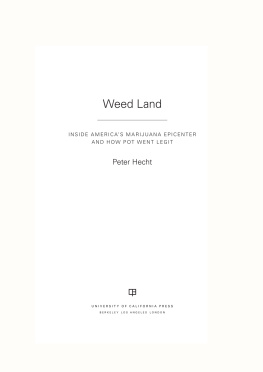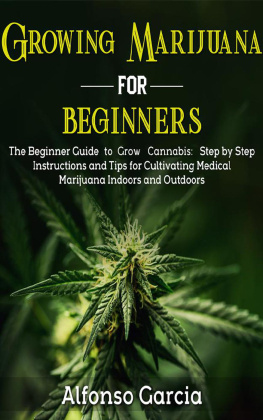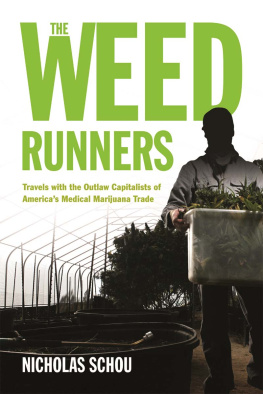
Weed Land
The publisher gratefully acknowledges the generous support of the General Endowment Fund of the University of California Press Foundation.
Weed Land
INSIDE AMERICAS MARIJUANA EPICENTER
AND HOW POT WENT LEGIT
Peter Hecht

UNIVERSITY OF CALIFORNIA PRESS
BERKELEYLOSANGELESLONDON
University of California Press, one of the most distinguished university presses in the United States, enriches lives around the world by advancing scholarship in the humanities, social sciences, and natural sciences. Its activities are supported by the UC Press Foundation and by philanthropic contributions from individuals and institutions. For more information, visit www.ucpress.edu.
University of California Press
Berkeley and Los Angeles, California
University of California Press, Ltd.
London, England
2014 by Peter Hecht
Library of Congress Cataloging-in-Publication Data
Hecht, Peter, 1956
Weed land : inside Americas marijuana epicenter and how pot went legit/Peter Hecht.
pages cm
Includes bibliographical references and index.
ISBN 978-0-520-27543-0 (pbk. : alk. paper)
ISBN 978-0-520-95824-1 (e-book)
1. MarijuanaCalifornia.2. MarijuanaTherapeutic useCalifornia.3. MarijuanaLaw and legislationCalifornia.4. Marijuana industryCalifornia.I. Title.
HV 5822. M 3 H 432014
363.4509794dc23
2013043271
Manufactured in the United States of America
23 22 21 20 19 18 17 16 15 14
10 9 8 7 6 5 4 3 2 1
In keeping with a commitment to support environmentally responsible and sustainable printing practices, UC Press has printed this book on Natures Natural, a fiber that contains 30% post-consumer waste and meets the minimum requirements of ANSI/NISO Z 39.48-1992 ( R 1997) ( permanence of Paper ).
In memory of my mother, Susan Sullivan Hecht, the writer in the family, 19232012
CONTENTS
ONE
The Way It Was Supposed to Be
For the California medical marijuana movement, this was its siege at Wounded Knee. Early in the morning of September 5, 2002, dozens of Drug Enforcement Administration agents, camouflaged and heavily armed, surged into the Santa Cruz Mountains. Their black-windowed four-wheel-drive vehicles, followed by a U-Haul truck, rumbled into the forest and up a winding road, climbing to a crescent-shaped ridge shrouded by coastal redwoods and eucalyptus. Beneath the ridge was a terraced marijuana gardena medicinal and spiritual refuge for the sick and dying.
Mike Corral, cofounder and supervising gardener for the Wo/Mens Alliance for Medical Marijuana, had just arisen. He heard the vehicles lurch to a stop at 6:45 outside his board-and-batten cottage, which had a grooved fiberglass roof and a solar heat collector. Corral had stayed there while his wife, Valerie Corral, and two female friends had gone to a James Joyce reading in Santa Cruz by local author and philosopher Robert Anton Wilson. The women were in the upper house on the property, a rustic, angular lodge perpetually under construction. They had gone to bed after sitting up until 3 A.M. wrestling with ideas for a hospice care program for terminally ill friends who used marijuana to quiet the searing pains from cancer or AIDS as they readied for their final journeys.
Mike Corral looked out a window to the clearing between his cottage and the WAMM garden, a flowering orchard of 167 marijuana plants, arranged with paths for wheelchairs and a welcoming sign: Love Grows Here. He saw agents bolting out with automatic weapons and then scurrying to assemble a battering ram. Corral ran to leash his Belgian sheepdog, Ebo, fearing they might shoot the dog if it were loose. He grabbed his cell phone, dialing the first five digits of Valeries number before the officers burst inside.
Where are you? they yelled.
They headed toward the stairs, their assault rifles leading the way. Corral moved toward the top of the staircase.
Im not violent. This is medical marijuana, he hollered. Ive got a phone in my hand. Im not going to resist.
Shirtless and wearing a pair of sweat pants, he started down the stairs and was hit immediately with blinding floodlights. Agents grabbed him, forced him facedown at the base of the stairs, and cuffed him. Corral saw a rifle barrel inches from his left eyeand sensed another half dozen weapons trained on him.
Wheres Valerie? the agents demanded.
The DEA task force was being led by agent Patrick Kelly, a thirty-one-year-old former U.S. Marine Corps captain fresh from an assignment as an air marshal after the September 11, 2001, attacks on the World Trade Center and the Pentagon. On loan from the DEA, Kelly had guarded flights in and out of Washington, D.C., and the 2002 Winter Olympics in Salt Lake City from would-be international terrorists. Now he was working for Group 2the marijuana unitin the DEAs San Francisco office. He was soon to become California supervisor of the DEAs Domestic Cannabis Eradication/Suppression Program, charged with targeting major drug traffickers and destroying illicit gardens of sometimes tens of thousands of plants. But Kelly didnt know that he was about to carry out the smallest raid, in plant number, of his career, or that it would trigger a backlash for the DEA for destroying a garden that alleviated the suffering of severely and terminally ill people. He didnt fathom the political flak the agency would take for unknowingly sending armed agents to the bed of a polio patient or for arresting a husband/caregiver, Mike Corral, and his wife, Valerie, an accident victim whom the marijuana movement and the media would cast as the Mother Teresa of medicinal cannabis.
Years earlier, Valerie had suffered head trauma in a bizarre car crash, in which a low-flying World War IIera P-51 Mustang training in the Nevada desert for an air show caused a Volkswagen Beetle she was riding in to tumble off a highway. The 1973 accident left Valerie with often uncontrollable grand mal seizures, triggering confusion, loss of muscle control, convulsions, and fainting. Mike, who married Valerie in 1978, would sometimes notice her eyes go blank in midconversation. She would touch the right side of her injured skull. Her body would shake. He would wrap his arms around her to keep her from wildly flailing or grab her before she hit the floor. A couple of times the seizures struck when they were at a restaurant. He scooped her up and carried her out.
Valerie had been a premed student at the time of her accident, but then she became a prisoner of the seizures and the multitude of prescription medicines meant to combat them. The drugs left her feeling listless, as if she were living under water, she would say. Mike Corral, a son of an IBM computer technician, had quit a tech job to become a nature photographer and then started reading up on marijuana. Drawn to a medical journal article on cannabis treating seizures in rats, he urged Valerie to try marijuana. In 1986, eight years after they were married, the couple moved to the wooded sanctuary north of Santa Cruz and Mike started growing a few plants on the property. Over time, pot reduced the intensity of Valeries seizuresso much so that Mike soon took to leaving prerolled joints in every room of the house. He lit one and brought it to her mouth each time she got the aura, that blank, fearful look signaling an attack coming on. Ultimately, marijuana succeeded in nearly quashing Valeries seizures altogether, weaned her from prescription meds, and gave her back her life.
In 1993, local authorities raided the Corrals five-plant garden, stirring protests from marijuana advocates. Mike Corral accepted drug treatment in lieu of prosecution for pot cultivation, only to aggravate his counselors by bringing in articles on the healing benefits of marijuana. Valerie filed Californias first-known medical necessity defense for marijuana. With her case set for trial, the Santa Cruz County district attorney abruptly dismissed charges against her. The same year, Mike and Valerie founded the Wo/Mens Alliance for Medical Marijuana. The Santa Cruz refuge for medicinal cultivation quickly drew in the sickest of the sick.
Next page







